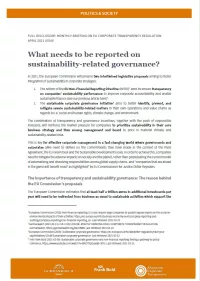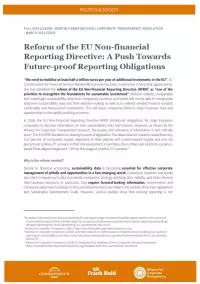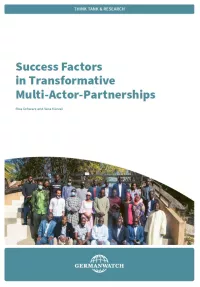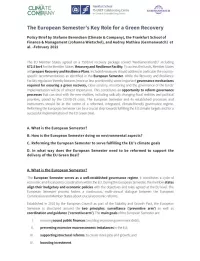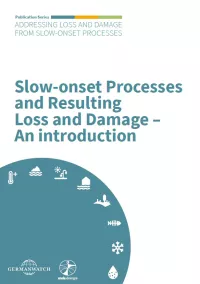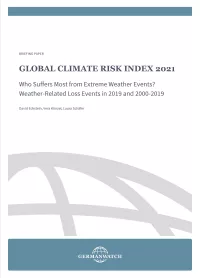
Aktuelles zum Thema
This year will be key for future climate policy and especially for sustainable finance in Germany and Europe. Sustainable Finance plays a crucial role in improving climate protection and sustainable growth. To this end, Germanwatch joined forces with the Alliance for Corporate Transparency in order to push towards greater corporate responsibility and disclosure requirements to meet the EU and Paris climate targets. In the second article of our briefing series "Full Disclosure: Monthly Briefing on EU Corporate Transparency Regulation", we aim to shed light on the revision the EU Non-Financial Reporting Directive carried out by the European Commission.
This year will be key for future climate policy and especially for sustainable finance in Germany and Europe. Sustainable Finance plays a crucial role in improving climate protection and sustainable growth. To this end, Germanwatch joined forces with the Alliance for Corporate Transparency in order to push towards greater corporate responsibility and disclosure requirements to meet the EU and Paris climate targets. This article kicks off and introduces our briefing series "Full Disclosure: Monthly Briefing on EU Corporate Transparency Regulation", in which we aim to shed light on the need for and benefits of forward-looking reporting requirements in a changing EU regulatory environment.
As a response to the Covid-19 crisis the EU has agreed on a historic recovery package of 750€ Billion, which includes funds for EU member states. In order to apply for financial support, EU member states need to provide Recovery and Resilience Plans. They may take into consideration country-specific recommendations, developed annually to address macroeconomic imbalance issues among EU Member States as identified within the European Semester.
In addition to amplifying extreme weather events, climate change also causes or intensifies slow-onset processes such as sea-level rise, desertification, biodiversity loss or permafrost thaw. Both types of climate change impacts cause loss and damage, impede the enjoyment of human rights and can be drivers for human mobility. In contrast to extreme weather events, dealing with loss and damage caused by slow-onset processes in the context of climate change is still neglected, both at the national and international level.
Bonn/Berlin (25th Jan. 2021). Vulnerable people in developing countries suffer most from extreme weather events like storms, floods and heat waves, while the impacts of climate change are visible around the globe. Being the deadliest and costliest tropical cyclone in the South-West Indian Ocean, tropical Cyclone Idai was labelled “one of the worst weather-related catastrophes in the history of Africa” by UN Secretary General Antonio Guterres.
The Climate Change Performance Index (CCPI) 2021 published today paints a mixed picture of progress by the European Union (EU) on climate action. While the Scandinavian EU countries, Portugal and the EU as a whole rank high on the index with relatively good indicators, Hungary, Poland and the Czech Republic stand out as outliers on climate progress within the bloc. In the overall ranking, the EU has improved from the 22nd place last year to the 16th place this year, almost exclusively thanks to a much better rated climate policy. The CCPI analyzes and compares climate protection across 57 countries (plus EU as a whole) with the highest emissions, which together account for 90 percent of global emissions.

